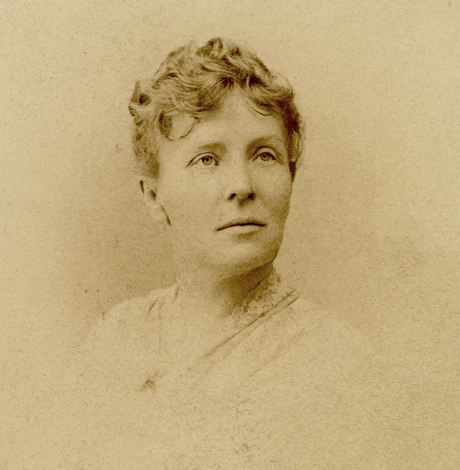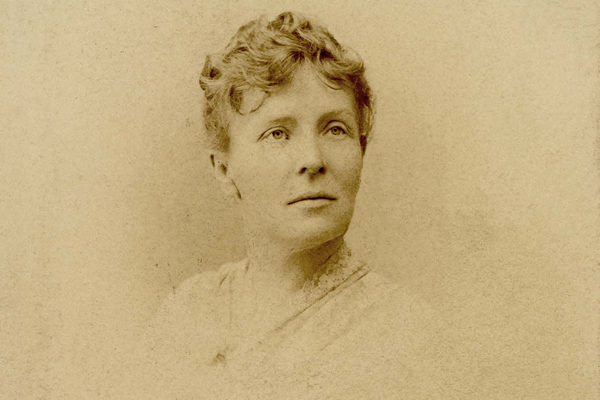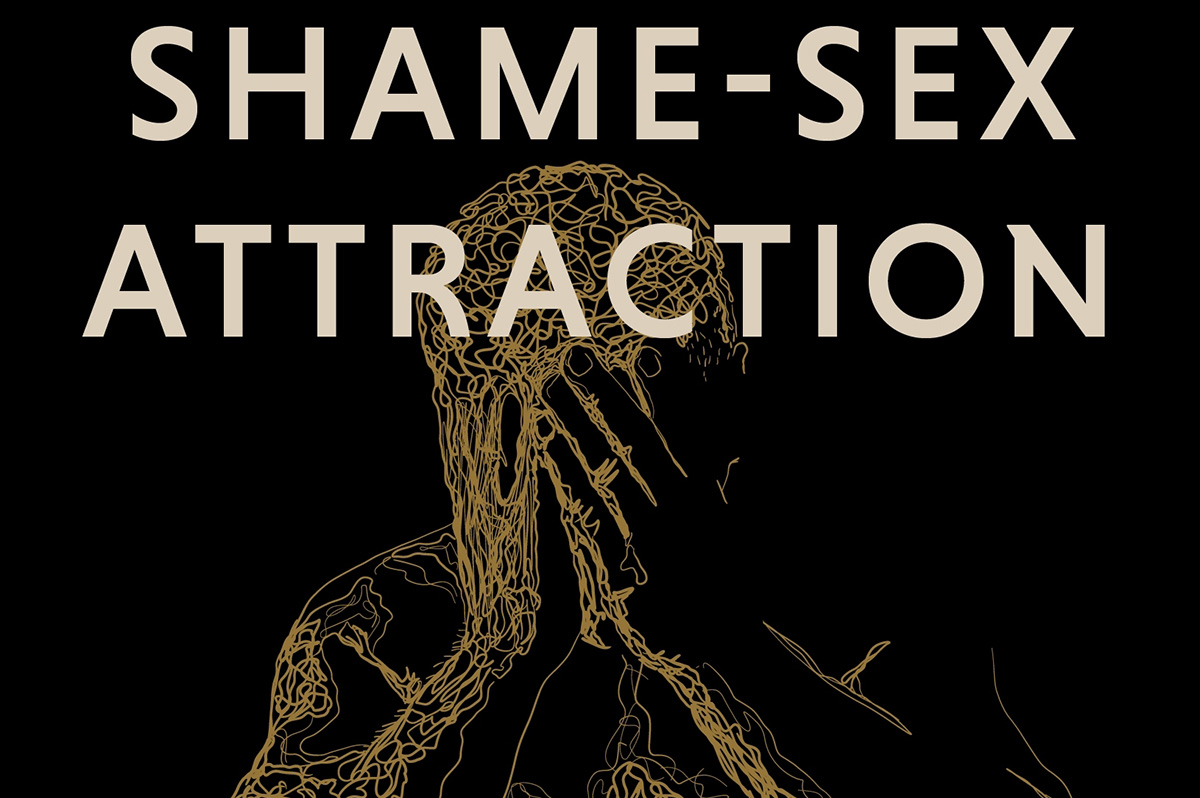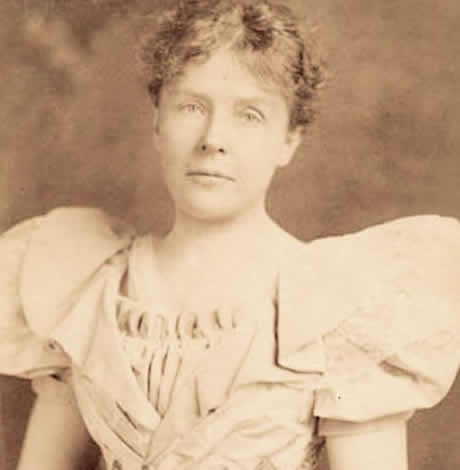Books
New book chronicles lesbian romance in late 1800s
President Grover Cleveland’s sister found sapphic love by mail


‘Precious and Adored: The Love Letters of Rose Cleveland and Evangeline Simpson Whipple 1890-1918’
Edited by Lizzie Ehrenhalt and Tilly Laskey, foreword by Lillian Faderman
Minnesota Historical Society Press
$19.95
264 pages
“You’ve got mail!”
If you’re waiting for a delivery, those words (or something like them) could absolutely make your week better. Just think, there was once a time when you waited days for messages to travel cross-country, and now it happens in an instant — although you’ll have to admit, after reading “Precious and Adored,” edited by Lizzie Ehrenhalt and Tilly Laskey, foreword by Lillian Faderman, that it’s sometimes just not the same.
Evangeline Simpson was a wealthy woman.
She was fiercely independent, too: after her husband, Michael, who was 48 years older than she, died and left her with $2.5 million in assets, Evangeline continued to travel, often solo, and tend to the estates she owned.
It was on one of her trips that she met Rose Cleveland.
Growing up, Rose also had access to the finer things in life. She was educated, refined and self-reliant, and was a natural stand-in for White House hostess when her bachelor brother became the nation’s 22nd president. By the time he married Frances Folsom in 1886, Rose was a much-admired public figure.
“It is possible,” say Ehrenhalt and Laskey, that Rose and “Eva” met in Florida in 1890, or they may’ve been slightly acquainted before a Valentine’s Day party they attended in Tampa that year. Whenever it happened, by April of 1890, letters began flying back and forth between them “in an explosion of anticipation, confusion and passion.”
Their love affair endured for “almost three decades,” except when Simpson — whom the authors believe was “sexually fluid” — was married to Henry Whipple, the first Episcopal bishop of Minnesota. She appeared to have genuinely loved the older man and had fallen “in love with God”; Cleveland pleaded through anguished letters for Eva to reconsider but the marriage proceeded, lasting until the Bishop’s death in 1901. Shortly afterward, Cleveland and Whipple took up where they left off.
Given today’s more open climate, there are two remarkable things about this story, as the editors point out: it all happened at a time when same-sex relationships between women were encouraged and somewhat celebrated, although homosexuality itself was condemned and often illegal. Women’s same-sex relationships were called “Boston marriages” with whimsy and a wink but Cleveland and Whipple, says Faderman in her foreword, “could have found no comfortable terms to describe” themselves.
It’s also quite noteworthy that most of the correspondence quoted in this book was taken from letters Whipple received from Cleveland, and saved. No one knows what happened to the letters Cleveland received from Whipple, and readers are largely left to consider the possibilities.
You’ll have a chance to do that by reading those letters, presented here following a very lengthy “introduction,” but doing so is an exercise that may be alternately difficult for their quaint Victorian floridity, and absorbing for their naked emotion. Just know that the true heart of this important entry in the history of lesbian and queer foremothers lies in its first half, making “Precious and Adored” a book that delivers.
Books
Chronicling disastrous effects of ‘conversion therapy’
New book uncovers horror, unexpected humor of discredited practice

‘Shame-Sex Attraction: Survivors’ Stories of Conversion Therapy’
By Lucas F. W. Wilson
c.2025, Jessica Kingsley Publishers
$21.95/190 pages
You’re a few months in, and it hasn’t gotten any easier.
You made your New Year’s resolutions with forethought, purpose, and determination but after all this time, you still struggle, ugh. You’ve backslid. You’ve cheated because change is hard. It’s sometimes impossible. And in the new book, “Shame-Sex Attraction” by Lucas F. W. Wilson, it can be exceptionally traumatic.

Progress does not come without problems.
While it’s true that the LGBTQ community has been adversely affected by the current administration, there are still things to be happy about when it comes to civil rights and acceptance. Still, says Wilson, one “particularly slow-moving aspect… has been the fight against what is widely known as conversion therapy.”
Such practices, he says, “have numerous damaging, death-dealing, and no doubt disastrous consequences.” The stories he’s collected in this volume reflect that, but they also mirror confidence and strength in the face of detrimental treatment.
Writer Gregory Elsasser-Chavez was told to breathe in something repellent every time he thought about other men. He says, in the end, he decided not to “pray away the gay.” Instead, he quips, he’d “sniff it away.”
D. Apple became her “own conversation therapist” by exhausting herself with service to others as therapy. Peter Nunn’s father took him on a surprise trip, but the surprise was a conversion facility; Nunn’s father said if it didn’t work, he’d “get rid of” his 15-year-old son. Chaim Levin was forced to humiliate himself as part of his therapy.
Lexie Bean struggled to make a therapist understand that they didn’t want to be a man because they were “both.” Jordan Sullivan writes of the years it takes “to re-integrate and become whole” after conversion therapy. Chris Csabs writes that he “tried everything to find the root of my problem” but “nothing so far had worked.”
Says Syre Klenke of a group conversion session, “My heart shattered over and over as people tried to console and encourage each other…. I wonder if each of them is okay and still with us today.”
Here’s a bit of advice for reading “Shame-Sex Attraction”: dip into the first chapter, maybe the second, then go back and read the foreword and introduction, and resume.
The reason: author Lucas F. W. Wilson’s intro is deep and steep, full of footnotes and statistics, and if you’re not prepared or you didn’t come for the education, it might scare you away. No, the subtitle of this book is likely why you’d pick the book up so because that’s what you really wanted, indulge before backtracking.
You won’t be sorry; the first stories are bracing and they’ll steel you for the rest, for the emotion and the tears, the horror and the unexpected humor.
Be aware that there are triggers all over this book, especially if you’ve been subjected to anything like conversion therapy yourself. Remember, though, that the survivors are just that: survivors, and their strength is what makes this book worthwhile. Even so, though “Shame-Sex Attraction” is an essential read, that doesn’t make it any easier.
The Blade may receive commissions from qualifying purchases made via this post.
Books
How one gay Catholic helped change the world
‘A Prince of a Boy,’ falls short of author’s previous work

Brian McNaught, the pioneering gay activist and author of 1986’s “On Being Gay” and 1993’s “Gay Issues in the Workplace,” has written a personal account about his Catholic faith and homosexuality. It is a memoir without much substance.
“A Prince of a Boy: How One Gay Catholic Helped Change the World” (Cascade Books) is a strong personal statement by McNaught. He helped change family relationships. He helped change attitudes about homosexuality. He helped change workplaces, but the world?

In January 2023, the Catholic News Service reported that Pope Francis announced that, “being homosexual is not a crime.” In December 2023, NPR reported that Pope Francis approved “Catholic blessings for same-sex couples, but not for marriage.” Francis died Monday at age 88. Although Catholics may not see homosexuality as a crime, they see sex outside of marriage as a sin. They see same-sex marriage as a sin.
In 2021, Gallup reported that membership in the Catholic Church had declined 20 percent since 2000. In 2025, the Pew Research Center’s Religious Landscape Study found that nearly 40 percent of Americans identified as Protestant, while the same study found that only 19 percent identified as Catholic.
McNaught devotes much of his book to his life as a gay Catholic. It is challenging to read about his personal struggle. Some readers may find it interesting. Others might find it boring. Catholic readers may find it more compelling than Protestant readers.
As the above statistics prove, McNaught has much more work to do to change the Catholic Church’s views about homosexuality. We should be glad for his contribution to the debate within the Catholic Church. We should pray for full acceptance of gays in the Catholic Church.
“A Prince of a Boy” becomes more interesting when McNaught describes his work as an educator on LGBTQ issues. He has had an impact on workplace policies, academic programs, and public education, and his lectures, books, and other materials are widely used.
Based on my experience in the federal government and volunteering with LGBTQ organizations from the Bay Area to Washington, D.C., I believe McNaught’s work as an educator has improved LGBTQ lives, careers, and families. During the Clinton administration, I gave many copies of “Gay Issues in the Workplace” to personnel directors. I felt their staff could benefit from reading it. I thought it would help the lives and careers of my federal LGBTQ colleagues.
McNaught’s “A Prince of a Boy” was released in December 2024. Anti-gay crusader Anita Bryant died the same month. Bryant campaigned against a gay rights law in Florida. She began a national campaign against gays.
When Bryant successfully reversed a gay rights ordinance in Dade County, Florida, McNaught wrote the important essay “Dear Anita, Late Night Thoughts of an Irish Catholic Homosexual.” The essay is not in “A Prince of a Boy”; however, McNaught mentions Bryant.
In his training programs, McNaught describes homosexuals as journeying from confusion to denial to acceptance to pride. “Anita Bryant and AIDS brought Gay people to identity pride very quickly,” McNaught writes. San Francisco Supervisor Harvey Milk (1930-1978) and other activists reached similar conclusions about Bryant’s vicious anti-gay campaign.
McNaught helped change the LGBTQ world and brought pride to many people’s lives. McNaught walks in pride, works in pride, and educates others in pride.
“A Prince of a Boy” is a disappointing book. It provides small details about Brian McNaught’s large, proud life. A meaningful biography about this great gay leader is long overdue.
The Blade may receive commissions from qualifying purchases made via this post.
Books
‘Pronoun Trouble’ reminds us that punctuation matters
‘They’ has been a shape-shifter for more than 700 years

‘Pronoun Trouble’
By John McWhorter
c.2025, Avery
$28/240 pages
Punctuation matters.
It’s tempting to skip a period at the end of a sentence Tempting to overuse exclamation points!!! very tempting to MeSs with capital letters. Dont use apostrophes. Ask a question and ignore the proper punctuation commas or question marks because seriously who cares. So guess what? Someone does, punctuation really matters, and as you’ll see in “Pronoun Trouble” by John McWhorter, so do other parts of our language.

Conversation is an odd thing. It’s spontaneous, it ebbs and flows, and it’s often inferred. Take, for instance, if you talk about him. Chances are, everyone in the conversation knows who him is. Or he. That guy there.
That’s the handy part about pronouns. Says McWhorter, pronouns “function as shorthand” for whomever we’re discussing or referring to. They’re “part of our hardwiring,” they’re found in all languages, and they’ve been around for centuries.
And, yes, pronouns are fluid.
For example, there’s the first-person pronoun, I as in me and there we go again. The singular I solely affects what comes afterward. You say “he-she IS,” and “they-you ARE” but I am. From “Black English,” I has also morphed into the perfectly acceptable Ima, shorthand for “I am going to.” Mind blown.
If you love Shakespeare, you may’ve noticed that he uses both thou and you in his plays. The former was once left to commoners and lower classes, while the latter was for people of high status or less formal situations. From you, we get y’all, yeet, ya, you-uns, and yinz. We also get “you guys,” which may have nothing to do with guys.
We and us are warmer in tone because of the inclusion implied. She is often casually used to imply cars, boats, and – warmly or not – gay men, in certain settings. It “lacks personhood,” and to use it in reference to a human is “barbarity.”
And yes, though it can sometimes be confusing to modern speakers, the singular word “they” has been a “shape-shifter” for more than 700 years.
Your high school English teacher would be proud of you, if you pick up “Pronoun Trouble.” Sadly, though, you might need her again to make sense of big parts of this book: What you’ll find here is a delightful romp through language, but it’s also very erudite.
Author John McWhorter invites readers along to conjugate verbs, and doing so will take you back to ancient literature, on a fascinating journey that’s perfect for word nerds and anyone who loves language. You’ll likely find a bit of controversy here or there on various entries, but you’ll also find humor and pop culture, an explanation for why zie never took off, and assurance that the whole flap over strictly-gendered pronouns is nothing but overblown protestation. Readers who have opinions will like that.
Still, if you just want the pronoun you want, a little between-the-lines looking is necessary here, so beware. “Pronoun Trouble” is perfect for linguists, writers, and those who love to play with words but for most readers, it’s a different kind of book, period.
The Blade may receive commissions from qualifying purchases made via this post.
-

 Virginia3 days ago
Virginia3 days agoYoungkin calls on gay Va. GOP LG candidate to exit race over alleged ‘porn’ scandal
-

 Opinions4 days ago
Opinions4 days agoNavigating employer-sponsored health insurance, care
-

 Maryland4 days ago
Maryland4 days agoA Baltimore theater educator lost jobs at Johns Hopkins and the Kennedy Center
-

 Books2 days ago
Books2 days agoChronicling disastrous effects of ‘conversion therapy’






